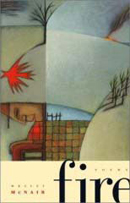Fire
DAVID R. GODINE, 2002
In his fifth collection, McNair writes on a wide range of subjects, casting his eye on everything from his own pet dog to an executive's torments in Hell. But the real beauty of the collection does not lie with its range, but with its carefully tended boundaries. Because he has grouped each section of poems in the book around a theme that is narrow enough to be definitive but ambiguous enough to prevent the poems from becoming pedantic or merely clever, McNair successfully speaks in both a personal tone, evoking an essay or memoir, and a more distant one, reminiscent of a folklorist.
Fire is one of McNair's most beautifully constructed collections of poetry, exquisite not only in the careful balance of its structure—of long poems against short, of personal against universal, of descriptive against reflective—but also in the detailed and authentic cadence of the true New Englander's voice that resounds through every line.
Select Praise
"McNair brings life to lifeless things."
—Boston Globe
"McNair has a kind of sixth sense for the poetry hidden in the unforgiving New England landscape."
— Minneapolis Star Tribune
"He has produced one of the most individual and original bodies of work by a poet of his generation."
— The Ruminator Review
"Is there any poet around who can catch the singular qualities of American voices better than Wesley McNair? If so, I haven't found him or her. In this, his fifth book of poetry — and for me his most beautiful and moving — he reunites a dismal collection of people (what we call a family) and lets everyone have his and her say. This unlikely project works only because of the power of his emotional investment and the certainty of his craft. Although largely about New Englanders, this is not regional writing. Only someone with a profound love and understanding of people and a superb ear could show how we can say so much while taking so long to say nothing."
— Philip Levine in Ploughshares
"Poems personal yet universal by a master craftsman with a remarkable ear and memory."
— Maxine Kumin in Ploughshares
"[He has] one of the most inventive minds in American poetry."
— Hartford Courant
